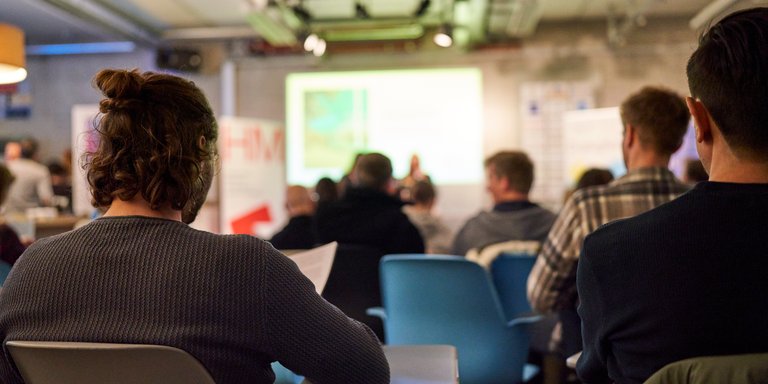
Munich climate targets 2035 -
Between wish and reality
Dialogue forum on 15 November 2023
properties.trackTitle
properties.trackSubtitle
In collaboration with HM:UniverCity and Hochschule München
Munich wants to become climate neutral. To achieve this, all stakeholders - administration, citizens, companies - must act quickly, energetically and together. Where do we stand in implementing this ambitious goal? What ideas and approaches are there to tackle the financial and operational challenges? At our dialogue forum, which we organized in cooperation with the Munich University of Applied Sciences' innovation network HM:UniverCity and the Munich University of Applied Sciences, we looked for answers together with renowned experts.

Small changes - big impact
"We have no more time, otherwise living conditions in Munich and the rest of the world will change drastically," warned Harald Lesch, Professor of Astrophysics at Ludwig Maximilian University. Especially in metropolitan areas, "heat is the silent killer". In principle, he believes a climate-neutral city is possible. Even small changes could have a big impact. "The ecological footprint of a school consists of 78 percent of the mobility of those involved. The elimination of parent cabs immediately leads to a noticeable reduction in CO2 emissions," Lesch made clear. The advantage of such a change in behavior is that no permits or technical equipment are required. However, renunciation is a word that does not have a high status in German politics. In addition, according to Lesch, the question of acceptance among citizens must be asked for all measures.


Turning liquid manure into hydrogen
In any case, there is no shortage of innovations for more climate protection. For example, in the conversion of biowaste into hydrogen. The start-up ecomates, which is supported by Munich University of Applied Sciences and the Strascheg Center for Entrepreneurship, has developed a smart degrader, a biogas plant for households. blueFLUX Energy AG is also pursuing this approach on a large scale. The high-tech company manufactures plants that convert residual materials such as sewage sludge, liquid manure or food waste into energy economically and sustainably.
"In our collaboration with the City of Munich, it was helpful that we won the "Energie Start-up Bayern" competition organized by the Free State of Bavaria in 2022," said Dr. Ulrich Mach, responsible for Business Development. He called for a discussion open to all technologies and more funding programs for innovators. Investors, especially in Germany, are also too hesitant when it comes to financing climate-friendly innovations.
"Climate change must become tangible," demanded Mach, referring to so-called real-world laboratories. These are experimental spaces for sustainability that act as an interface between science and practical partners. "We are currently setting up the "Almwirtschaft Windkreut" real-world laboratory here in Peissenberg to show how the process from cow to hydrogen works."
Acting instead of laboring
"Real-world laboratories are important in order to get on the right path to greater sustainability," Lesch emphasized. However, there are situations in which there is no longer any need for laboratories because we have long known where we are heading. "It's a scandal that new buildings in Germany are still being built without photovoltaics on the roof because there are no permits. Why don't you just let people do it if it doesn't harm anyone, instead of enforcing an administrative regulation on principle?" he asked.
Leuprecht agreed: "We have built up an insane apparatus and now have to fight our way through the administrative jungle," he admitted. He also found it difficult to contribute creatively under these conditions. After all, the integrated neighborhood approach was launched together with the planning department in order to achieve the goal of climate neutrality. As a link between overarching planning and building-related measures, the district offers the opportunity to develop a sustainable electricity and heat supply, mobility, waste and water management as well as green and open space provision together with local people. "It is important not to act from above, but to take measures at eye level with the citizens," he said, describing the recipe for success.

Role models Paris and Barcelona
Barcelona shows what successful urban district policy can look like. There, the creation of so-called superblocks has succeeded in reducing motorized private transport and increasing the quality of life in the districts. Paris is also leading the way on the road to a traffic turnaround with strict measures. "Even in Berlin, a lot of things are easier, partly because people may not always behave in accordance with the law," says Climate Council representative Hladky.
Munich appears to be well on the way to becoming climate-neutral in the next decade. One major obstacle is that, unlike city states such as Hamburg, the state capital has no legislative powers of its own and is dependent on the Free State of Bavaria. Even if some projects disappear back into the drawer, the work was not in vain, as Lesch made clear:
"At the moment, the socio-economic mainstream is clearly against the climate. But when the climate crash comes, the mainstream will need alternatives. All niche players are important for this because they show options for action." It is not yet possible to predict how the mix of new technologies, behavioral changes and renunciation will change society. "I wish the city of Munich good luck with the transformation. It will need it," Lesch concluded the evening.
Panelists:
Prof. Harald Lesch
Professor of Astrophysics at Ludwig-Maximilians-Universität, Munich
Maximilian Leuprecht
Head of the "Climate Protection and Energy" division in the Department for Climate and Environmental Protection of the city of Munich
Silvia Hladky
Civil society representative in the Climate Council of the City of Munich
Dr. Ulrich Mach
blueFLUX Energy AG
Moderation:
Paju Bertram
Programm Management HM:UniverCity


